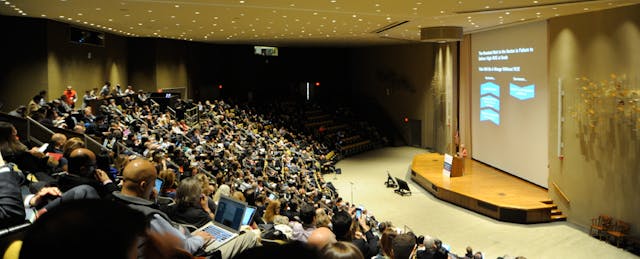David H. Rose, founder and chief education officer of CAST, smiled gently at the audience as a colorful picture of a brain appeared on the screen behind him: “What differentiates your brain is how it’s connected, what we call the ‘Connectome,’ a kind of riff on ‘genome,’” he told the crowd of several hundred. “Everyone’s Connectome is different—and those differences are in important places for educators.”
Rose’s was one of four keynote sessions at this year’s LearnLaunch (#LearnLaunch15) conference, held last Friday and Saturday in Boston, and co-sponsored by the Harvard Graduate School of Education and Harvard Business School. The third annual gathering of the New England edtech community drew more than 700 people, Eileen Rudden, president of the LearnLaunch Institute announced at Friday’s opening talk. (Even Saturday’s six or so inches of snow didn’t deter conference goers.)
LearnLaunch has emerged as the center of a vibrant edtech startup community and is a combination of a nonprofit and for-profit: The nonprofit LearnLaunch Institute runs conferences and more than 30 meetups and classes each year, aiming to create a strong web of connections between educators and entrepreneurs in the region. LearnLaunch also manages a co-working space as well as an accelerator program that invests in and nurtures startups. So far, it has “graduated” 13 companies; its next three-month program starts on February 9.
This year’s conference marked a step up from a year ago—more people, more potential investors and more momentum. For instance, Rudden noted that the number of participants has more than doubled over the past two years.
Friday began with a session closed to investors in which 12 companies presented their business plans and ideas. “There are more entrepreneurs that are farther along in their journey” than she had expected, noted Rudden. Winning the top number of votes was Allovue, a startup that aims to help schools fight ineffective budgeting and financial analysis practices. (Test prep company, Testive, was runner up.)
Keynotes covered the waterfront from business to research: Deborah Quazzo, founder of GSV Advisors and a member of the Chicago Board of Education, gave a brisk opening address about whether the edtech industry is a “mirage.” (“I want to get rid of these bubble metaphors,” she said.)
Big numbers dominated her examples: Coursera has 11 million students and offers 65,000 courses a month; Knewton is used by 7 million students; ClassDojo is used by more than 35 million teachers, parents and students; Quizlet is used by 30 million; MasteryConnect is used by 22 million students.
Even so, such big numbers will be a mirage without evidence that tools make a difference, she noted.
“There isn’t enough data around outcomes,” Quazzo said. She offered seven pillars that will be fundamental to giving all students access to quality education, beginning with universal pre-K education, including technology as an “accelerant” to support teachers, and a clear focus on the needs of a modern workforce.
Michael Horn, Executive Director of the Clayton Christensen Institute, interviewed Knewton founder and CEO Jose Ferreira. Ferreira said that Knewton’s adaptive “platform” is moving toward being able to “eat” content—tagging and aligning it according to how fast different types of students have learned it. “I can tell you what’s the most effective piece of content, and which is good for what kinds of students,” he said.
Ferreira said that Knewton, which has been working with large publishers including Houghton Mifflin and Cengage, will apply its technology to Open Educational Resources (OER) content later this year.
During the Q&A session, EdSurge asked him about the status of a 2012 highly publicized pilot project to deliver Knewton’s technology to incarcerate youth. Ferreira conceded that the project was shut down—that “bigger opportunities” with partner Houghton Mifflin had superceded the project.
Rose’s talk on the brain offered a neuroscience perspective of why schools need to think deeply about how to differentiate learning. He pointed out that in the design work done by his organization, the Center for Universal Design for Learning, providing students with multiple means of engaging with learning is the “most explosive” area of research.
Diane Tavenner, founder and chief executive of Summit Public Schools, would likely agree. Her powerful talk about the multi-year effort Summit has put into redesigning its schools underscored the idea of building learning around students (rather than forcing the students to conform to a school.)
Summit, founded in 2003, runs nine schools, serving 2,000 students who reflect the demographics and socioeconomic diversity of their neighborhoods. Tavenner described how she felt several years after running Summit when we she learned that 55% of her students had graduated from college in six years—double the national average.
“I still remember getting that result,” she recalled, choking up at the memory. “Tears were rolling down my face. I had given more of myself to the kids in those classes than I did to my own son. And 55% just wasn’t good enough.”
Last year, Summit radically changed the way it teaches students, creating a deeply project based learning environment. Technology—particularly a platform for managing students’ personal learning plans—is crucial, she said. Summit is now redesigning that software platform, with support from Facebook, to make it usable by others. It’s also seeking partnerships with 20 other schools that want to pilot its learner-centered approach and the software in their schools.
Tavenner’s talk was a galvanizing moment, capturing both the status and promise of education reform and technology. And that, Rudden says, is just what LearnLaunch aimed to deliver.


